![]()
• Spinster: Making a Life of One’s Own, by Kate Bolick (As someone who has spent the majority of her adult life single and somewhat cloistered, I found it strange to read a memoir about spinsters by a woman who is obsessed by the idea but has rarely, if ever, engaged in the life that the term describes. I enjoyed some of the history, but as a memoir it feels like there’s some missing self-awareness. Throughout the book, until literally the last couple pages, she presents spinsterhood and a retrograde and very straight conception of marriage where a woman bears children for a money-earning man while being limited entirely to the domestic sphere as the primary and only serious options she’s considering in life. I realize that extreme is not something she invented, but the historical subjects she discusses all represent gray areas between those extremes that are far more personal and nuanced.)
• Against the Romance of Community, by Miranda Joseph (A central premise of this book is that community and capitalism are perceived as binary oppositions by US society, but that’s not a framework I’ve ever operated within and doesn’t resonate for me. Certainly some people try to use that as a selling point for false characterizations of community, but this, along with a couple of other central suppositions around which communities she was talking about made it tough for me to get into this book. There’s definitely some useful points, but it’s taking on huge subjects and feels both scattered and myopic in a way that robs it of some of its potential impact.)
• Zami: A New Spelling of My Name – A Biomythography, Audre Lorde (As fantastic, beautiful, painful, and rich as everyone says. A long time coming to my life, but surely will be relevant for some time to many readers. And also, a gloriously sexy book as well.)
• Ladies First: Revelations of a Strong Woman, Queen Latifah (A gift from a friend who knows me well.)
• Life List: A Woman’s Quest for the World’s Most Amazing Birds, Olivia Gentile (A wonderful read for a the burgeoning birder in me, although clearly also a bit of a warning of the obsessive nature of the pastime.)
• The Village Effect: How Face-to-Face Contact Can Make Us Healthier, Happier, and Smarter, Susan Pinker (Read as research for the Unknown Play Project. The gender essentialism in this book is infuriating at times and very repetitive, but ultimately I do think there was some really useful stuff in here.)
• Apart, Catherine Taylor (Read for Hyperallergic, read the review here.)
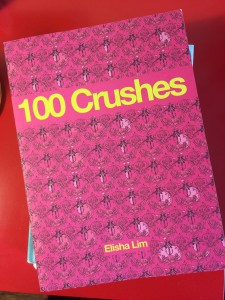 • 100 Crushes, Elisha Lim (This book is wonderful. The honesty and openness and love expressed in it are refreshing and very affecting. And I really appreciated the ways in which they are open about shifts and changes within them, which is so hard to articulate but so important.)
• 100 Crushes, Elisha Lim (This book is wonderful. The honesty and openness and love expressed in it are refreshing and very affecting. And I really appreciated the ways in which they are open about shifts and changes within them, which is so hard to articulate but so important.)
• A People’s Art History of the United States: 250 Years of Activist Art and Artists Working in Social Justice Movements, Nicolas Lampert (This book is great, written by someone committed to history. It’s such a great foil to the internet writing I’ve been so steeped in lately, chock full of references and nuance and actual information rather than supposition and heresay. Really liked it.)
• A People’s Art History of the United States: 250 Years of Activist Art and Artists Working in Social Justice Movements, Nicolas Lampert (This book is great, written by someone committed to history. It’s such a great foil to the internet writing I’ve been so steeped in lately, chock full of references and nuance and actual information rather than supposition and heresay. Really liked it.)
• Redefining Realness: My path to Womanhood, Identity, Love & So Much More, Janet Mock (A very well done memoir that also balances the singular voice against the wider social context in which she lived/s.)
• The Paying Guests, Sarah Waters (Not my favorite of Waters’ books, it goes on a bit and the way it plays out is a little frustrating, but I’ll return to her writing again I’m sure.)
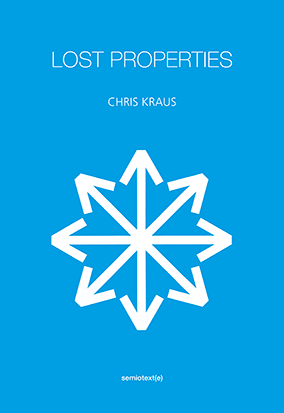 • Lost Properties, Chris Kraus (Love her skeptical tone and in this shorter form I really enjoy the dips in and out of theory.)
• Lost Properties, Chris Kraus (Love her skeptical tone and in this shorter form I really enjoy the dips in and out of theory.)
• My Education, Susan Choi (Precisely what I was looking for at this moment, a totally consuming story—felt like a humorous answer to Wonder Boys in its way.)
• To Believe in Women: What Lesbians Have Done For America – A History, Lillian Faderman (A very useful reference and history.)
• Relish: My Life in the Kitchen, Lucy Knisley (A fun quick read that a friend passed along.)
• The Summer We Got Free, Mia McKenzie (Once I got drawn into this story I couldn’t put it down. Made me think over and over of a saying I recently read: “Resentment is the poison that you drink believing the other person will die.” Great read.)
• You Learn by Living, Eleanor Roosevelt (I wanted to find a great biography of her to read but my sources seemed to indicate that there isn’t actually a great contemporary biography out there just yet, which was odd to me. I opted for this instead. It’s okay, mostly a little finger-waggy, and I still wish I could find a good contemporary biography.)
• Growing Up Female: A Personal Photo-Journal, Abigail Heyman (I had read about this extended photo essay online and was very curious to have a look. The personal reflections and personalized design made me think of a highly produced zine. It might have been even more intimate and impactful as a zine. It’s so interesting that it was a lucrative book for a publisher in the 1970s—makes me reflect even more on the loss of feminist bookstores.)
• Alone With Other People, Gabby Bess (There are so many feelings this collection brought back to the surface after not relating to them for many years.)
• Grand Canyon Women: Lives Shaped by Landscape, Betty Leavengood (Purchased while at the Canyon and devoured in the car thereafter, it definitely made me daydream many moments about disappearing into the depths and not coming back out any time soon.)
• Margaret Fuller: A New American Life, Megan Marshall (Have long been interested in and curious about Fuller, was really glad to find a great updated biography of her life, truncated though it was.)
• The Girls Next Door: Into the Heart of Lesbian America, Lindsy Van Gelder & Pamela Robin Brandt (Read as part of my research for my documentary project. Found it helpful for some context and history, at least from this couple’s perspective, but the narration is a little heavy-handed and bummed there were no references listed anywhere in the book.)
• What We Made: Conversations on Art and Social Cooperation, Tom Finkelpearl (Really found this book to be a helpful and useful conversation about social practice, at the same time that it acknowledges some of the difficulties. More of my thoughts are up on Hyperallergic.)
• A Queer and Pleasant Danger: The true story of a nice Jewish boy who joins the Church of Scientology, and leaves twelve years later to become the lovely lady she is today, Kate Bornstein (One of the surprises I enjoyed in reading this book was learning that Holly Hughes mentored and is friends with Kate.)
• I Love Dick, Chris Kraus (From the book: “By this I think she means that every time you try and write the truth it changes. More happens. Information constantly expands.”)
• To Be Young, Gifted, and Black: An Informal Autobiography, Texts by Lorraine Hansberry, edited and arranged posthumously by Robert Nemiroff (This is a complicated connection, given that it’s primarily fragments of her writing compiled posthumously by her ex-husband. It leaves quite a bit out. What it does do, though, is give you brief glimmers of her radiant mind and fierce politics.)
• Hold It Against Me: Difficulty and Emotion in Contemporary Art, Jennifer Doyle (Found so many of the insights and perspectives offered in this book really useful. Read my thoughts about it on Hyperallergic.)
• 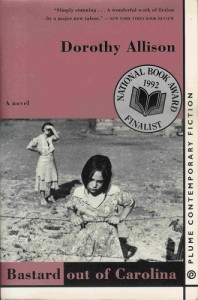 Bastard Out of Carolina, Dorothy Allison (This book is so fantastic. I had never read it before and did so to take a break from non-fiction reading for a minute. The way in which the emotional landscape of the lead character, Bone, is portrayed is so rich and raw in a way that felt totally honest about adolescence in a way that I don’t feel like I’ve read often. And the way in which her rage and trauma plays into her burgeoning sense of her sexual self is complex and clear in a way I don’t think I’ve ever read before.)
Bastard Out of Carolina, Dorothy Allison (This book is so fantastic. I had never read it before and did so to take a break from non-fiction reading for a minute. The way in which the emotional landscape of the lead character, Bone, is portrayed is so rich and raw in a way that felt totally honest about adolescence in a way that I don’t feel like I’ve read often. And the way in which her rage and trauma plays into her burgeoning sense of her sexual self is complex and clear in a way I don’t think I’ve ever read before.)
• Networked: The New Social Operating System, Lee Rainie & Barry Wellman (After the first quarter of the book it really stopped being as interesting. It’s confusing who they intend their audience to be—the advice at the end felt particularly odd—why would sociologists advocate one way to behave or another, rather than to simply observe? Most of their insights are really the Pew Center’s insights.)
• Washed Up: The Curious Journeys of Flotsam and Jetsam, Skye Moody (I bought this in a small and quite old store for sailors while visiting with a friend, but didn’t get a chance to read it for a few months. It’s wonderful and upsetting—the knowledge of all that mess floating out there. But it was a fun read, even with the narrators quirks.)
• The Signature of All Things, Elizabeth Gilbert (I’m so pleased that Gilbert has returned to fiction. A friend gave me her first short story collection, Pilgrims, years ago, and I loved it. This book was an extremely readable and fun collision of many of my favorite things, and I appreciate the thinking beneath both the story and the structure of the story.)
• Where Good Ideas Come From: A Natural History of Innovation, Steven Johnson (I was reading this for research, and admittedly I was skeptical about whether or not it would actually be useful, but having read it, I really found a lot of it useful.)
• The Beautifully Worthless, Ali Liebegott (It was great to read this, not a novel, not-not a novel, short, internal, full of great wordplay and observations.)
• Chaos or Community? Seeking Solutions, Not Scapegoats for Bad Economics, Holly Sklar (Remarkable for how spot on some of her writing in this 1995 book is for the situation we find ourselves in at this moment, nearly 20 years later.)
• The Flamethrowers, Rachel Kushner (Kushner’s patience in this novel is remarkable—her careful depictions of the men in the book, her reversal of the gaze, and her main character’s quiet internal negotiations are very well-rendered, I think.)
• The Political Economy of Art, John Ruskin (Referenced in an essay on art and labor that I read recently, found a reprint of one of the early editions. There’s a very funny and still accurate 150+ year old take down of the art market, but ultimately his ideas in this book come across as pretty patrician, in that he argues the wealthy and the state should control the way that artists are compensated and the conditions of their work. I gather that later in his life his ideas morphed a bit.)
• But is it art?, Cynthia Freeland (A great, terse overview of many ideas within institutional philosophy or art, but not so much outside the institution.)
• Nevada, Imogen Binnie (A good counter to people who think that good writing can’t also be messy and personal and in a voice that doesn’t abide by many rules.)
• Art & Discontent: Theory at the Millenium, Thomas McEvilley (His writing is dense with reference and history, and the challenges to art historical narratives and pat explanations of why and how art transforms are great.)
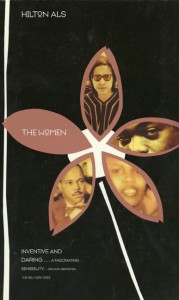 • The Women, Hilton Als (The only word that I could come up with to characterize my impression of Als’ voice in this book was surgical—it felt precise, detached, and rigorous. I admire it, but it’s also difficult to image being under his microscope.)
• The Women, Hilton Als (The only word that I could come up with to characterize my impression of Als’ voice in this book was surgical—it felt precise, detached, and rigorous. I admire it, but it’s also difficult to image being under his microscope.)
• Fall on Your Knees, Ann-Marie MacDonald (This book and another project I was working on led me to spend some time considering southern gothic as a form. Both things made me appreciate the form much more than I had before.)
• An Archive of Feelings: Trauma, Sexuality, and Lesbian Public Cultures, Ann Cvetkovich (There’s a lot to discuss in this book, but at the moment that I read it, I appreciated it most for it’s insistence on nuance, complicating what appears to be simple or general, giving emotion credence, and welcoming ambiguities.)
• Innovation: The Basis of Cultural Change, H.G. Barnett (No wonder this book kept being referenced in others. It’s pretty fantastic for it’s non-specific, very open definition of and interest in cultural change, which is what he really means by the term ‘innovation.’)
• Giving an Account of Oneself, Judith Butler (This is not an easy read, but her primary points, about acknowledging the ambiguity and instability of our ‘selves,’ and also acknowledging that in others, is a powerful one.)
• Marbles: Mania, Depression, Michelangelo, and Me, Ellen Forney (I bought this as a treat for myself in the afternoon and finished it by evening. Sometimes a graphic novel is just the thing.)
• I Still Believe Anita Hill: Three Generations Discuss the Legacies of Speaking Truth to Power, edited by Amy Richards and Cynthia Greenberg (I’ve talked to a lot of people about our memories of the Hill hearings while reading this book. I was 11 at the time. My memory associates them with shame and being punished for speaking up. But I also remember accusing a classmate in 6th grade of sexual harassment, and I can’t think of where else I would have gotten the idea—the timing is more than coincidence. It was enlightening and great to read about how much that episode served to galvanize so many others into action.)
• Heroines, Kate Zambreno (This kept coming up in a friend’s Facebook feed, so I decided to get a copy. After reading it I was surprised by the fact that more Facebook friends hadn’t mentioned it. I feel like Jelinek is a great forebear to list for this one. This book is fantastic and rich and totally integrated in terms of subject and form. This movement from the loose voice of the internet to a crafted printed voice is exciting to see. I loved Dodie Bellamy’s transition and though I didn’t read Zambreno’s blog, I really appreciate that all of that work is present in this new form.)
• Feminism is for Everybody: Passionate Politics, bell hooks (This came to me by way of a group of young feminists in the city who were hosting a kind consciousness-raising workshop focused on anti-racist work. This book is a fantastic reminder of what feminism is, has been, and can be—and mostly importantly, she really succeeds in making it highly readable.)
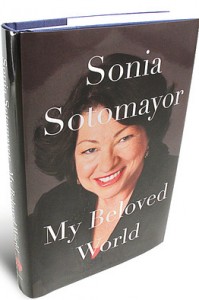 • My Beloved World, Sonia Sotomayor (An intriguing and rich story, if sometimes contradictory.)
• My Beloved World, Sonia Sotomayor (An intriguing and rich story, if sometimes contradictory.)
• The Meaning of Freedom: And Other Difficult Dialogues, Angela Davis (There’s some good stuff in these speeches, but it makes me want to read more in-depth writing from her as well.)
• Art as Experience, John Dewey (Despite being very aggravating in it’s winding and too-wordy prose, there’s a ton of good stuff in here. I wrote about this book for Hyperallergic.)
• Who Is Ana Mendieta?, Christine Redfern and Caro Caron (A very good and worthwhile read.)
• Debt: The First 5,000 Years, David Graeber (Perhaps the most important point in the entire book is that debt and the markets that are driven by it are often predicated on fictional ownership, colonialist thievery, and enslavement via threats of violence.)
• Women’s Barracks, Tereska Torres (Pretty much just great, particularly the Feminist Press edition.)
• Gender Trouble: Feminism and the Subversion of Identity, Judith Butler (Because I hadn’t read it before. Though probably a bit heavy for Thanksgiving reading, but, that’s the time I had.)
• Seven Days in the Art World, Sarah Thornton (Let’s just say it was interesting to read this book the week after Thornton published her essay about why she no longer wants to write about the visual art market.)
• The Art Instinct: Beauty, Pleasure and Human Evolution, Denis Dutton (This book is little better than a muddled literature review, but Dutton insists on taking credit for a good deal of the thinking he summarizes. Ultimately it offers little in the way of insight and there’s an abhorrent and overly lengthy half-assed discussion where he attempts to draw a parallel between art and the female orgasm. Are you fucking kidding me?)
• My Awesome Place: The Autobiography of Cheryl B, Cheryl Burke (Glad to have had a chance to read this one—a classic New York city story told from a non-classic perspective.)
• How to Live: Or A Life of Montaigne in One Question and Twenty Attempts at an Answer, Sarah Bakewell (A fantastic blend of history of ideas, philosophy, biography, and social history. Bakewell’s writing is so readable and thoughtful, I can’t help but admire this work.)
• Sister Citizen: Shame, Stereotypes, and Black Women in America, Melissa V. Harris-Perry (After listening to this discussion earlier in the year, I added this book to my list, glad to have had the chance to read it.)
• Rughum & Nadja: A Novel, Samar Habib (Saw this title appear on Sarah Schulman’s Facebook newsfeed and was looking for a beach read so decided to give it a go.)
• Queer Spirits, AA Bronson and Peter Hobbs (Read this because Hyperallergic asked me to review it, and really glad to have encountered it. I wrote about this book for Hyperallergic.)
• Open City, Teju Cole (Unfortunately, I found this book a little frustrating, but I’ve never been a huge fan of the flaneur novel.)
• The Revolution Will Not Be Funded: Beyond the Non-Profit Industrial Complex, edited by Incite! Women of Color Against Violence (Learned a great deal in reading this, and was challenged to push even further with some of my own thinking about non-profits. I wrote about this book for Hyperallergic.)
• Creative Enterprise: Contemporary Art Between Museum and Marketplace, Martha Buskirk (Well worth a read for anyone with any connections to the arts.)
• 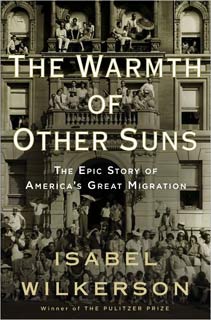 The Warmth of Other Suns: The Epic Story of America’s Great Migration, Isabel Wilkerson (This book is fantastic and deserves to be read by many people. I can’t think of a more compelling account of such a huge swath of history.)
The Warmth of Other Suns: The Epic Story of America’s Great Migration, Isabel Wilkerson (This book is fantastic and deserves to be read by many people. I can’t think of a more compelling account of such a huge swath of history.)
• Beautiful Necessity: The Art and Meaning of Women’s Altars, Kay Turner (Really a remarkable work, tracking a largely invisible, but deeply important tradition that cuts across cultures, beliefs, and identities.)
• The Origins of Cultures: How Individual Choices Make Cultures Change, W. Penn Handwerker (Clearly this is just a sketch of a book, some of the ideas are tangential or underdeveloped. There are some interesting beginnings of ideas though.)
• Are You My Mother?: A Comic Novel, Alison Bechdel (As I said to the friend who gave me a copy of the book, I swallowed it whole. A fantastic example of why art provides such a rich opportunity for alternative forms of intellectual inquiry.)
• 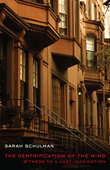 The Gentrification of the Mind: Witness to a Lost Imagination, Sarah Schulman (Schulman’s writing here is disagreeable in the best possible sense, she refuses to make what she’s saying agreeable and instead focuses on stating her experience, ideas, and observations clearly, and with support where warranted. Thought there are points I would argue with her on, that’s kind of the point. It’s refreshing to see this smart, ranging work by a woman, a lesbian no less, published and receiving the serious attention it deserves.)
The Gentrification of the Mind: Witness to a Lost Imagination, Sarah Schulman (Schulman’s writing here is disagreeable in the best possible sense, she refuses to make what she’s saying agreeable and instead focuses on stating her experience, ideas, and observations clearly, and with support where warranted. Thought there are points I would argue with her on, that’s kind of the point. It’s refreshing to see this smart, ranging work by a woman, a lesbian no less, published and receiving the serious attention it deserves.)
• The Decline of Pleasure, Walter Kerr (Some of this book is a definitely a product of its time, but there a lot in the first half that’s incredibly spot on, even some 50+ years later.)
• Next Generation Democracy: What the Open-Source Revolution Means for Power, Politics, and Change, Jared Duval (Though I had heard bits and pieces of the ideas Duval is talking about before, he puts thing together in a compelling argument for a completely plausible and possible participatory democracy. It’s make me think how I could help to institute some of these ideas in the communities I live and work in.)
• A Short Life of Trouble: Forty Years in the New York Art World, Marcia Tucker, with help and editing from Liza Lou (Like Smith’s book below, I felt like there was a certain insistence on being clear about what it felt like to live her life and make the choices she made. She was a remarkable lady. I’m only sorry it took me this long to get to know her work.)
• Just Kids, Patti Smith (This read as really honest and unconcerned with the need to make it fit other people’s ideas of who she or Mapplethorpe were. I don’t think that’s easy to pull of. I admire her for it.)
• Homo Aestheticus: Where Art Comes From and Why, Ellen Dissanayake (Found this to be a compelling argument about the origins and act of art-making that attempts to avoid isolating it through a discipline-specific understanding. Will be reading one of her other books next.)
• Behind the Beautiful Forevers: Life, Death, and Hope in a Mumbai Undercity, Katherine Boo (As fascinating for its form as its content.)
• Radioactive: Marie & Pierre Curie – A Tale of Love and Fallout, Laura Redniss (A remarkable example of the unique domain of art and its ability to express ideas, questions, research, and provocation in ways that are untenable elsewhere.)
• The Influencing Machine, Brooke Gladstone (How could you not love this book? And Gladstone’s On the Media has long been my favorite radio program. Well worth the read.)
• So Many Enemies, So Little Time: An American Woman in All teh Wrong Places, Elinor Burkett (I picked this up in a tiny beachside used bookshop in Costa Rica and wouldn’t let it go. A smart, tough, and fascinating discussion of what it means to be an American abroad and one of the most interesting post-Sept. 11 writings that I’ve read.)
• On Michael Jackson, Margo Jefferson (I heard Jefferson speak on a panel and was eager to read her book. There’s some very interesting thinking in here about America’s relationship with the so-called “freak” that would be worth expanding on.)
• 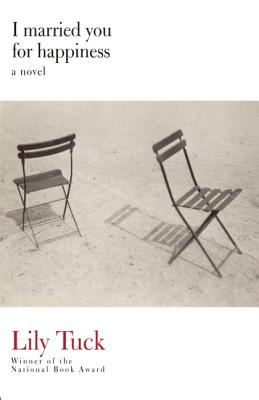 I Married You For Happiness, Lily Tuck (Beautifully written and very well constructed. This book was excellent.)
I Married You For Happiness, Lily Tuck (Beautifully written and very well constructed. This book was excellent.)
• Half the Sky: Turning Oppression into Opportunity for Women Worldwide, Nicholas Kristof & Sheryl WuDunn (Some of the cynical and problematic ways they tell their stories get in the way of a strong and important message. Nevertheless, it was illuminating and it’s hard to read without wanting to take some action.)
• The Challenge for Africa, Wangari Maathai (A compelling argument, beyond her other arguments and viewpoints, that true change can only come from within.)
• Bird Cloud, Annie Proulx (Read will in residence in the woods upstate—an literary escape while away from home.)
• Blood, Bones, and Butter: The Inadvertent Education of a Reluctant Chef, Gabrielle Hamilton (My best friend sent me this book. It is many things, but the two most worth nothing are it’s detailed look behind a few curtains I’ve never peeked behind before, and the willfulness of the writer.)
• Wild Comfort: The Solace of Nature, Kathleen Dean Moore (This book is so thoughtful and beautiful in so many ways. I picked this up at the Brooklyn Botanic Gardens, while brooding one day about how much I missed being in the woods. This book is so much more than “nature writing”—it’s comprised of observation, philosophy, lived experience, and serious inquiry. I admire the writer tremendously.)
• Why Are Artists Poor? The Exceptional Economy of the Arts, Hans Abbing (I think Abbing is too focused in this book on the products of artistic practice, specifically on the sale of visual art works, which causes the book to be too limited in its approach to figuring out the economy of the arts. That said, it’s a great beginning to a discussion that I think it only just getting warmed up.)
• World Stages, Local Audiences: Essays on performance, place and politics, Peter Dickinson (A dense and far-reaching collection of scholarly essays that raises some serious questions about the nomadic nature of art that hopes to enlighten and inspire change being presented to people, who, inevitably, bring with them their local and personal experience.)
• Common As Air, Lewis Hyde (This book coalesces so much thinking so elegantly around issues related to intellectual property and the progress that ideas offer our society. Should be read by many.)
• The Next American Revolution, Grace Lee Boggs with Scott Kurashige (Cannot recommend this book enough. Read it.)
• The Radiance of the King, Camara Laye (A bit long, but a fascinating journey.)
• Outrageous Fortune: The Life and Times of the New American Play, Todd London & Ben Pesner (If you are in the theater you really must read this. I don’t know why it took me so long to get to it.)
• Thinking Like An Editor, Susan Rabiner & Alfred Fortunato (Great advice for someone looking for it.)
• A Heart as Wide as the World: Stories on the Path to Lovingkindness, Sharon Salzberg (I’m just at the beginning of dipping my toes into Buddhism and this is my first foray. A very worthy one.)
• One Hundred Demons, Lynda Barry (A wonderful attempt at exorcism.)
• Harriet Chalmers Adams: Adventurer and Explorer, Second Edition, Durlynn Anema (Sad to think such a fascinating woman is largely lost in history, but such is the case with so many women.)
• West With the Night, Beryl Markham (Funny to me that this book is listed so often in lists of great travel books, when, in fact, it’s very much an ode to the country she called home for most of her life. It’s really only listed as a travel book because the presumption is that the reader has never been to Markham’s home.)
• Critical Play: Radical Game Design, Mary Flanagan (Recommonded by a friend—a great overview of games in art, in the broadest sense, that then taps into contemporary software-based gaming culture. Interesting that she also has an agenda in this book to radicalize gaming.)
• The Thousand Autumns of Jacob de Zoet, David Mitchell (A wonderfully engrossing read for cold New York nights. There’s so much too this book.)
•  Inferno, Eileen Myles (Fantastic journey. I read it twice. To learn to live, to work, and to love—I should be so lucky to know all three.)
Inferno, Eileen Myles (Fantastic journey. I read it twice. To learn to live, to work, and to love—I should be so lucky to know all three.)
• Role Models, John Water (This book was more than a few pleasures to read—an intellectual pleasure, an ethical and philosophical pleasure, a guilty pleasure, and on and on. Waters’ self-awareness, his openness with himself and with others, his artistic integrity, and his humanity are remarkably present in this book. I had no idea. And now I love him.)
• Sum: Forty Tales from the Afterlives, David Eagleman (Read this because I kept hearing about it from so many sources. In the end, I felt like the heavily moralistic overtones and the very anthropocentric view of most of the tales were kinda grating. Less soapbox, more imagination, I say. And kinda thought the one scenario where God was a lady was a little lame. Why even bother at that point, and when it’s so hamfisted?)
• Kate: The Woman Who Was Hepburn, William J. Mann (Makes her out to be a conflicted human being rather than an untouchable. Ultimately it reads like there’s a good amount of speculation involved, but a sad true-ish sounding story.)
• A Challenge for the Actor, Uta Hagen (A really great book on the craft of acting.)
• Open, Andre Agassi (This is an incredibly compelling story, told in novelistic detail in the first half. A classic hero’s journey, but with more attention to the arbitrary nature of life’s trials. Just the right thing for a summer read.)
• Shoplifting From American Apparel, Tao Lin (This book was not good—a nouveau existentialism that reveals yet another story about a bunch of bored twenty and thirty-somethings who can’t think of anything more interesting to do with their lives than nothing.)
• A Simple Heart, Gustave Flaubert (I’m not entirely sure why I feel such an affinity for Flaubert, but I do. His writing and his perspective are incredibly enticing to me, even when they border on the maudlin.)
• The Naming of Names: The Search for Order in the World of Plants, Anna Pavord (A very well-researched and readable book on the history of the development of an idea—taxonomy. Pavord explores the genesis of taxonomy through the lineage of botany, all the while revealing the individuals and historical events that contributed to the development of the naming of names in the plant world.)
• Fun Home: A Family Tragicomic, Alison Bechdel (I’m struck most by the gyroscopic structure of this book—the way it circles back over the same set of circumstances with a new perspective, but still never gains control over the elements included. A fascinating book.)
• An Education, Lynn Barber (Funny how different the book is from the salacious promises that the back cover touts. I’m glad it is what it is and not what the marketing team attached to it wants it to be.)
• Barf Manifesto, Dodie Bellamy (A difficult work that circles back into itself and the community it concerns quite a bit.)
• Fingersmith, Sarah Waters (I tore through this book. Waters is clearly a very talented storyteller. The predominant thought I have after reading this one is about the prisons we create within ourselves and that we allow or perpetuate around us. Guess I’ll have to read Joe LeDoux’s book soon…)
• Tipping the Velvet, Sarah Waters (I would think it would be hard not to get sucked in to this book. Enjoyed it too much to think about what clever tricks besides strong storytelling she’s using to carry the reader along.)
• Committed, Elizabeth Gilbert (Not her best work. But she still gets my vote, as she had it from Pilgrims onward. I look forward to her leaving memoir behind.)
• Baby Remember My Name, edited by Michelle Tea (Who doesn’t like a good anthology now and again?)
• Rebecca, Daphne du Maurier (Haven’t read a good page-turner in awhile. Had to stay up late to finish this one.)
• Free Fire Zone, Theresa Rebeck (Picked this up after interviewing Rebeck. So far it’s the best book about the business of writing that I’ve read, with an emphasis on business. Learned and laughed a lot.)
• Martha Quest, Doris Lessing (Will finally have to read The Golden Notebook after reading this.)
• Lucky in the Corner, Carol Anshaw (A book club I was thinking about joining was reading this. Turns out I can’t go to the first meeting and didn’t love this book, but will give it another try.)
• Odd Girls and Twilight Lovers, Lillian Faderman (A jarring reminder that despite my fondest beliefs, our civilization does not tend toward greater tolerance.)
• We Have Always Lived in the Castle, Shirley Jackson (I was surprised to find that though I didn’t at first imagine myself having much interest in this story, at the end, when I began to think about reinterpreting it, something new entered the story that was exciting—the isolation of perception described here is a powerful and disturbing reality.)
• My Life in France, Julia Child & Alex Prud’Homme (I’m ashamed to say I had no idea how hard she worked. And I love the idea that a bildungsroman could start in the main character’s early thirties.)
• A Wheel Within A Wheel, Frances E. Willard (Too excellent; so much fun.)
• At Large and At Small: Familiar Essays, Anne Fadiman (A perfect example of why the essay is one of the most insightful, interesting, flexible, and often unexpected forms.)
• A Short History of Women, Kate Walbert (Subtle, as promised. I can’t help wishing it was a bit richer.)
• First Execution, Domenico Starnone (This book calls a lot of attention to its structure and it’s easy to get lost, but the getting lost did pay off in the end, and my interest in tales of political disillusionment only seems to grow.)
• The Wind in the Willows, Kenneth Grahame (Just wonderful. And the edition that my mother got for my brother and I as children has the most wonderful illustrations for the story, perfectly pitched, by Michael Hague.)
• Bad Girls Go Everywhere: The Life of Helen Gurley Brown, Jennifer Scanlon (Scanlon is out to paint a specific portrait of HGB, but it’s a very compelling and very timely one.)
•  Crossing to Safety, Wallace Stegner (An incredibly well-told story, which weaves in many of the themes and ideas about the role of storytelling in our lives that I’ve been puzzling over lately. A wonderful read.)
Crossing to Safety, Wallace Stegner (An incredibly well-told story, which weaves in many of the themes and ideas about the role of storytelling in our lives that I’ve been puzzling over lately. A wonderful read.)
• Disquiet, Julia Leigh (Recommended by a friend from work, an excellent, absorbing read, that reminded me of why I always loved to read Poe’s breathless and strange stories.)
• Our Life in Gardens, Joe Eck & Wayne Winterrowd (Everything I hoped it would be. I padded through it from cover to cover.)
• The Day of the Locust, Nathanael West (What great storytelling! And all the dreams of Hollywood dashed. A great book.)
• Benjamin Franklin: An American Life, Walter Isaacson (You can really see why Isaacson is such a popular biographer now—it’s a very readable and smooth progression that’s presented here, and a reasonable attempt to paint Franklin as the human he was rather than the caricature we like to imagine him as. It’s been a useful piece of research for my new show.)
• New Grub Street, George Gissing (And the closing chapter in this little triptych on the business of art, or specifically literature—a Victorian literary world trying to reconcile art and commerce as unsuccessfully as they ever have been. It seems like we might actually end up reverting to more of a Victorian model of investors and personal investments in the next century, but who’s to say.)
• Grub, Elise Blackwell (A funny book to read after Hyde’s. It’s amazing how much things refuse to change in certain arenas, but how much we insist that ought to.)
• The Gift: Creativity and the Artist in the Modern World, Lewis Hyde (A wide-ranging book with some interesting conclusions. Like many others I’ve spent a fair amount of time worrying over some of these questions, but I’m not sure yet that there’s an answer. I suppose what Hyde’s book leaves me with is a stronger sense that there likely isn’t a need for an answer to these questions.)
• The Ruins of California, Martha Sherrill (I’d been looking for books about California and my friend Beth brought this one over for me, it was a great start. And how odd for me two novels in a row with juvenile narrators, I’ve been reading so many other things in between this past two novels I didn’t even remember that Hedgehog was the last. Anyhow, a good story, and that satisfaction of a strange view of a country I only think I know.)
• The Elegance of the Hedgehog, Muriel Barbery, translated by Alison Anderson (The title of this book does it no justice at all. The piece ranges widely, is sharp and incisive, has deeply human characters. And perhaps the most wonderful thing is the shattering lack of sentimentality that the author has for her characters or the world around her. I admire this story a great deal, heart-breaking though it is.)
• Advice for a Young Investigator, Santiago Ramón y Cajal, translated by Neely Swanson and Larry W. Swanson (It’s remarkable how aptly so much of Cajal’s advice applies to the artist. And it’s also amazing to see such concise and spot-on advice for scientists that is over 100 years old—the book was originally published in 1897. It’s also clear that this translation makes all the difference.)
•  The Encantadas, Herman Melville (It’s imperfect, of course it’s imperfect, the metaphors are occasionally very foggy and sometimes get mixed up, but the richness and density of the imagery in a single one of his sentences is breathtaking.)
The Encantadas, Herman Melville (It’s imperfect, of course it’s imperfect, the metaphors are occasionally very foggy and sometimes get mixed up, but the richness and density of the imagery in a single one of his sentences is breathtaking.)
• Bouvard and Pécuchet, Gustave Flaubert (What a perfect example of my own travails so much of the time…)
“For the creative writer the major problem seems to be to know the patterning of the grain; and these can hardly be discovered in rich color without understanding of the many sequences of the American tradition on the popular side as well as on purely literary levels. The writer must know, as Eliot has said, ‘the mind of his own country—a mind which he learns in time to be much more important than his own private mind.’ A favored explanation for the slow and spare development of the arts in America has lain in stress upon the forces of materialism. But these have existed in every civilization; they have even at times seemed to assist the processes of art. The American failure to value the productions of the artist has likewise been cited; but the artist often seems to need less of critical persuasion and sympathy than an unstudied association with his natural inheritance. Many artists have worked supremely well with little encouragement; few have worked without a rich traditional store from which consciously or unconsciously they have drawn. The difficult task of discovering and diffusing the materials of the American tradition—many of them still buried—belongs for the most part to criticism; the artist will steep himself in the gathered light. In the end he may use native sources as a point of radical departure; he may seldom be intent upon early materials; but he will discover a relationship with the many streams of native charactre and feeling. The single writer—the single production—will no longer stand solitary or aggressive but wihtin a natural sequence.”
–Constance Rourke in American Humor: A Study of the National Character